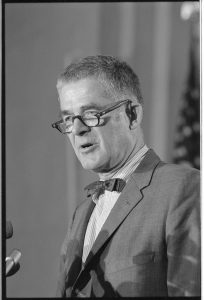 On June 15, 1215, on a field outside London, a group of barons met with the King of England to sign what would become one of the most influential documents ever written, Magna Carta. King John, widely regarded as the one of the worst kings to ever sit on the English throne, had waged an unsuccessful war against France in an attempt to win back territory he had lost. To pay for the ultimately unsuccessful war, King John seized lands, levied huge taxes, and charged exorbitant fines for small offenses. Fed up, the barons revolted and seized London. They forced the King, who saw him rule as ordained by God, to sign a document that would instead limit him by “the law of the land.” For the first time, Magna Carta offered protection against the arbitrary will of the King, preventing him from locking people up and seizing property without what would later become know as “due process.”
On June 15, 1215, on a field outside London, a group of barons met with the King of England to sign what would become one of the most influential documents ever written, Magna Carta. King John, widely regarded as the one of the worst kings to ever sit on the English throne, had waged an unsuccessful war against France in an attempt to win back territory he had lost. To pay for the ultimately unsuccessful war, King John seized lands, levied huge taxes, and charged exorbitant fines for small offenses. Fed up, the barons revolted and seized London. They forced the King, who saw him rule as ordained by God, to sign a document that would instead limit him by “the law of the land.” For the first time, Magna Carta offered protection against the arbitrary will of the King, preventing him from locking people up and seizing property without what would later become know as “due process.”
Of course, a few weeks after Magna Carta was signed King John got the Pope to declare Magna Carta invalid, thrusting both sides back into conflict. But subsequent kings and British legal minds, such as Sir Edward Coke, would bring Magna Carta back and ensure that its protections against the arbitrary whims of a ruler became the lasting law of the land. And when colonists settled in the New World, they took those ideas with them, enshrining them in the Declaration of Independence and the Bill of Rights.
Magna Carta was the first step towards ensuring that no king, queen or president could be above the law — an idea that remains just as important today as it was on a field outside London over 800 years ago.
Learn more about Magna Carta and the limits of executive authority from our film Magna Carta and the Constitution.


